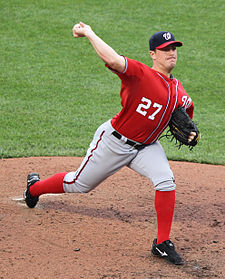There was a report on Tuesday night that the Chicago Cubs were “in talks to acquire” Jordan Zimmermann from the Washington Nationals. The report cited no sources by name, did not identify the players Chicago might send in return and did not come to fruition, but it immediately set off a series of conversations on Twitter: What would a fair trade look like? How could the Cubs, who say they intend to compete in 2015 and would be acquiring a player who could make that dream a reality, and the Nationals, who have won two of the last three NL East titles and are in no position to rebuild, find a match?
I ended up having a conversation I found interesting, though, that centered on what it is, exactly, for which the Cubs would be paying. Here’s how that conversation started:
curious how and if the cubs are able to land zimmermann without dealing bryant
— Brady Childs (@HPJoker) November 12, 2014
I balked at that. Brady countered with an argument people often advance in situations like this one: the Cubs would be trading, he said, for both Zimmermann’s 2015 season (after which he’s due to hit free agency) and the right to extend him for future seasons. It could even be a condition of the trade, he noted, the way it was for the Boston Red Sox (run by Theo Epstein, as the Cubs are now) when they dealt for Adrian Gonzalez.
It’s an understandable mentality, and it’s closer than ever to being valid. Barring a shocking run of contract extensions, next winter’s starting pitcher market will be the most robust in several seasons. Several teams will have holes to fill, and several strong arms will be available to fill them. It could turn into a free-for-all, and given the market dynamics of the league right now, that could mean a whole lot of money getting doled out to even the second and third tier of available hurlers. If the Cubs believe that could be the case, or if they simply favor Zimmermann over all the other possible free-agent options next winter (and aren’t sure they’ll be able to easily outbid others), it almost makes sense to sweeten the pot and pay extra at the front end for those extra seasons.
It almost does, but it doesn’t.
There’s just no reason that a team should ever pay, in talent, for the right to extend a player on the cusp of free agency. Pre-arbitration contract extensions are often huge money-savers for teams. They grant not only cost certainty and a bit of extra time, but a discount that reflects both the salary constraints the player would encounter if he eschewed the deal, and the risk the club is assuming by committing in advance.
Extensions that come just a year or two shy of free agency, though, tend to be unnecessary market-level commitments before the decision point. A trade between two teams is always a matter of balancing surplus value, the amount of production players can return, relative to their salaries, at points in their new teams’ competitive cycles that leverage that production. A long-term extension for a player who gets paid like a free agent doesn’t add significant surplus value, so a team shouldn’t add anything significant to the trade package in question in order to complete a trade.
The Zimmermann rumor is dead, at least for now. Several competing reports shot down the initial one, and while all of these reports were fundamentally anonymous and vague, the credibility of the crowd overwhelmed that of the lone reporter who suggested a deal was in the works. The last thing I want to do is ask: What would a Cubs-Nationals trade centered on Zimmermann look like?
First of all, I want to establish that such a deal is unlikely. It always was. The teams don’t match all that well. Zimmermann is a short-term asset, and while Washington has the depth to replace him and the needs in other places to motivate them to deal, it doesn’t make much sense to trade a high-value, short-term asset while planning to win in the short term—as the Nats are. The Cubs, for their part, want to move forward in 2015, but aren’t necessarily in a position to accelerate their building plan this aggressively. They’re certainly not properly set up to mortgage the farm in an effort to win now.
Here’s the best I can come up with: Javier Baez. He’s really the first, best, only fit. The Nationals are set in the outfield. They need a second baseman, and that’s about it, at least in the near term. The Cubs would never give up Starlin Castro (reasonable, pre-arbitration extension), Addison Russell (elite prospect status intact) or Kris Bryant (the best prospect in baseball, bar none) for Zimmermann. Baez, though, got a big enough taste of the big leagues in 2014 to both tantalize those who believe in him and galvanize those who don’t, striking out a ton but showing power and speed commensurate with his lofty reputation.
Chicago could conceivably build a strong infield without Baez; Washington could conceivably value his ceiling highly enough to deal away their last season of control over their co-ace. It’s not a likely move, but it’s the most likely one. And it definitely does not place value on the right to extend Zimmermann.
Next post: Fun With Run DistributionsPrevious post: Joe Mauer Must Adapt in Order to Remain Useful





Leave a Reply